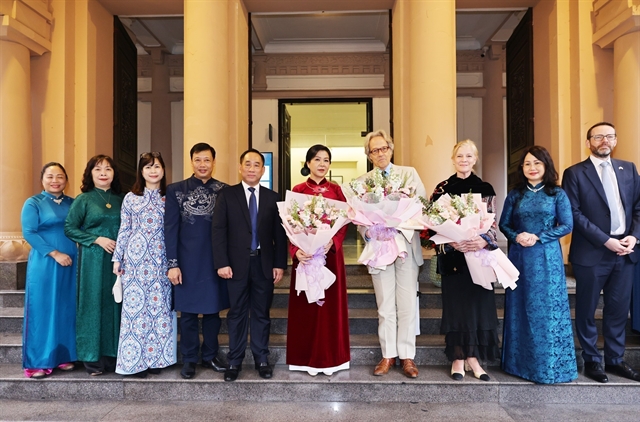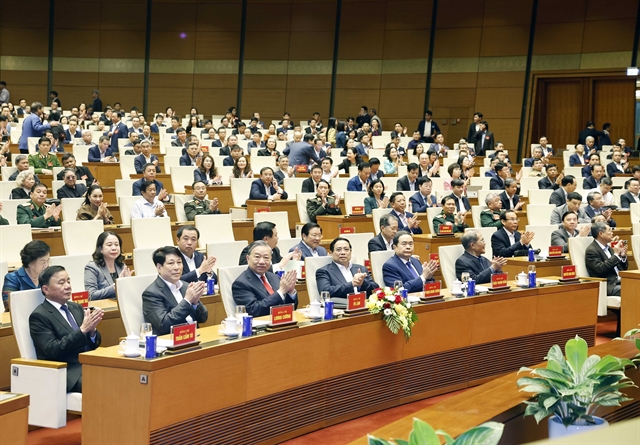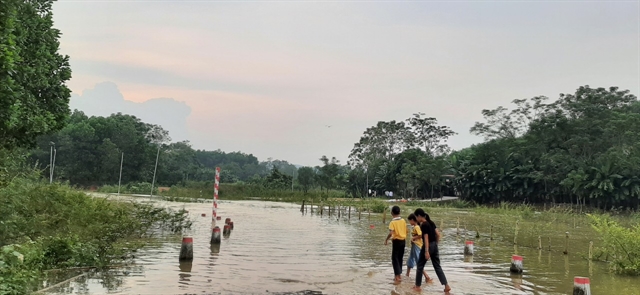 Society
Society
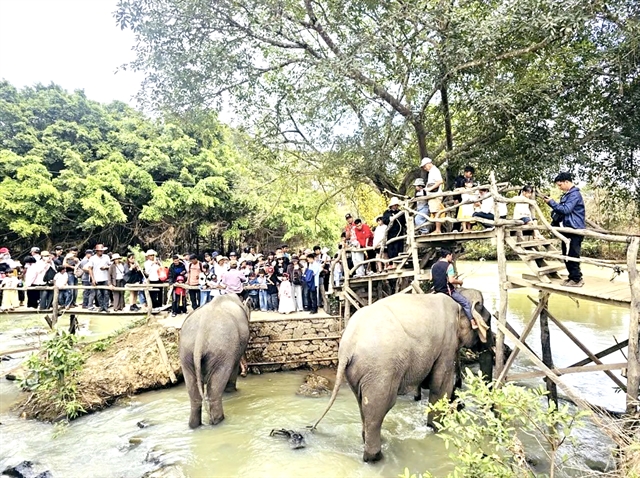
 |
| Prolonged rainstorms submerged crops in deep water and isolated hundreds of households in Như Xuân District, Thanh Hóa Province. — Photos courtesy of World Vision. |
HÀ NỘI — “When water was rushing into our house, I was terrified because I couldn’t swim. All I could do was crying out to Grandma while she was scrambling to move the rice and electronics out of the water,” Tuấn, a 14-year-old boy in Thanh Hóa Province, recalled.
Some memories will be with Tuấn and Tuyết (his grandma) for the rest of their lives as their house was ravaged by erratic rainstorms despite all the safety precautions taken.
In 2023, over 1,100 natural disasters hit Việt Nam, leaving 166 people dead and missing, causing estimated damages of over US$338 million. Natural disasters have caused serious consequences, disrupting people’s lives and slowing down economic development of many communities.
“Evidence and statistics have shown that children were among the most vulnerable ones in such a climate emergency. We need to prioritize resources and efforts in promoting climate-resilient communities in Viet Nam to protect our children,”said Doseba Tua Sinay, National Director, World Vision International in Việt Nam.
As the Chair of the ASEAN Committee on Disaster Management (ACDM) in 2023, Việt Nam has demonstrated its leadership role by implementing many activities with positive results, one of the significant initiatives is the Hạ Long Ministerial Statement on the Strengthening of ASEAN Anticipatory Action in Disaster Management.
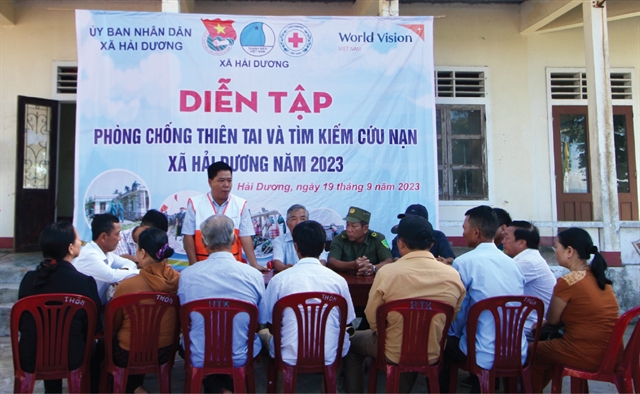 |
| A simulation session that reflects World Vision's locally-led anticipatory action. |
Việt Nam's Deputy Minister of Agricultural and Rural Development Nguyễn Hoàng Hiệp, Deputy Head of the National Steering Committee for Natural Disaster Prevention and Control emphasised that "anticipatory action" is a new approach in disaster management, implemented by the United Nations and countries worldwide to further enhance disaster prevention and preparedness, with a focus on vulnerable groups.
Activities include strengthening forecasting, and warning systems for disasters; disseminating information regarding natural disasters to local communities; inspecting and maintaining the safety of disaster prevention and control structures; evacuating residents from hazardous areas to safety; among many others.
Understanding the region’s natural and social challenges while fostering innovative approaches to the obstacles, World Vision has been integrating an anticipatory action approach, or forecast-based early action, to disaster risk reduction and emergency relief programmes.
The project “Enhancing Forecast-Based Early Action for Effective Disaster Preparedness” (FBEA) is an example, which was initiated and implemented by the consortium of three international NGOs namely World Vision, CARE and Plan; in collaboration with Ministry of Agriculture and Rural Development; Ministry of Natural Resources and Environment; Việt Institute of Meteorology, Hydrology and Climate Change; Provincial People's Committee, Committee for Natural Disaster Prevention and Control.
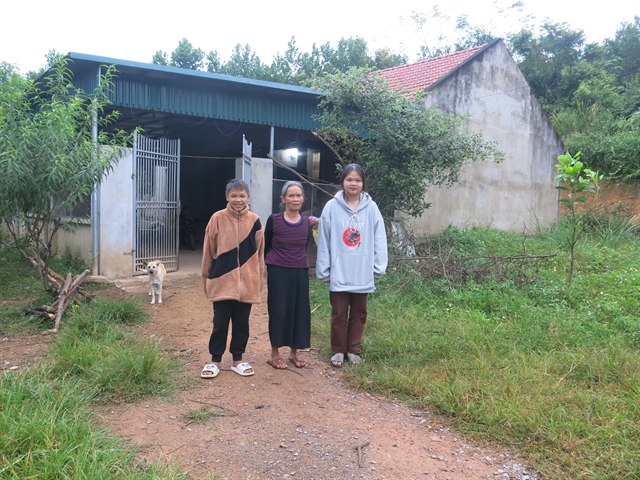 |
| With World Vision’s support and anticipatory approach, Tuyết and her two grandchildren have been more well-prepared to cope with disaster risks. |
FBEA -responsive forecast-based early action for effective disaster preparedness among ASEAN countries, with a specific focus on Việt Nam.
The initiative has supported more than 6,500 people to improve their capacity to manage disaster response and prevention plans. Moreover, in 2023, World Vision extended the effort to capacitate 26,189 community members, including children, in Disaster Risk Reduction, which increased their resilience to natural disasters.
Employing a child-focused and holistic approach, World Vision International in Việt Nam’s disaster management programs focused on ensuring the safety and well-being of the most vulnerable children and communes like Tuấn's family.
World Vision’s interventions also aimed to enhance vulnerable communities’ resilience and readiness through livelihood interventions.
To better cope with the increasingly extreme and unpredictable nature of the rainy season, Tuyết and 3742 other households participated in World Vision’s Ultra Poor Graduation programme and were supported to switch to short-cycled crops and animals, such as seasonal vegetables and chickens.
Following World Vision’s recommendation on timing and husbandry techniques, Tuyết’s chickens grew up to their full size and were ready for sale before the rainy season started, minimising production damages.
World Vision International in Việt Nam promotes the participation of children and youth in emergency protocol rehearsals, first-aid, and protection before, during, and after disasters.
These “junior forces”, equipped with skills, would play an essential role in implementing disaster risk reduction efforts in their communities.
“Thanks to World Vision’s summer swimming class, I know how to swim now. Water rising doesn’t terrify me anymore,” Tuấn “showed off” proudly.
“With the increasingly complex nature of climate change, Việt Nam is among the countries most affected by extreme climate events and suffers from severe loss and damage. To address this situation, World Vision Việt Nam has been working closely with international, national, and local partners to provide immediate emergency relief and recovery programs, long-term livelihood interventions, and capacity training to help the community enhance resilience against disasters and climate change. Such efforts aim to ensure the well-being of children and community members, especially the most vulnerable ones like Tuấn's family,” remarked by LêVăn Dương, Humanitarian and Emergency Affairs/Disaster Risk Reduction (HEA/DRR) manager, World Vision International in Việt Nam.
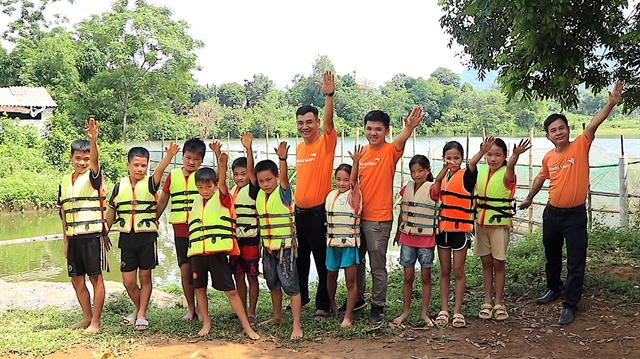 |
| With the community-based approach, World Vision prioritise capacity training on disaster risk reduction for not only local rapid response teams but also for community members and school children. |
Pauline Tamesis, UN Resident Coordinator in Viet Nam, stressed the necessity to strengthen cooperation in the Disaster Risk Reductioni Partnership (DRRP) by creating effective communication and cooperation channels among NDMP members, ministries, sectors, localities, the private sector, and non-governmental organisations, thereby building a comprehensive approach to disaster management.
“Joining hands to act early on a large scale is possible and effective against natural disasters, helping people receive support more early and quickly with costs reduced by half compared to the response phase,” she noted.
Anticipatory action has been implemented by 35 countries all over the world, covering 7.6 million people worldwide, ensuring they were better prepared to act ahead of the predictable impacts of hazards and able to recover more quickly afterward. — VNS


